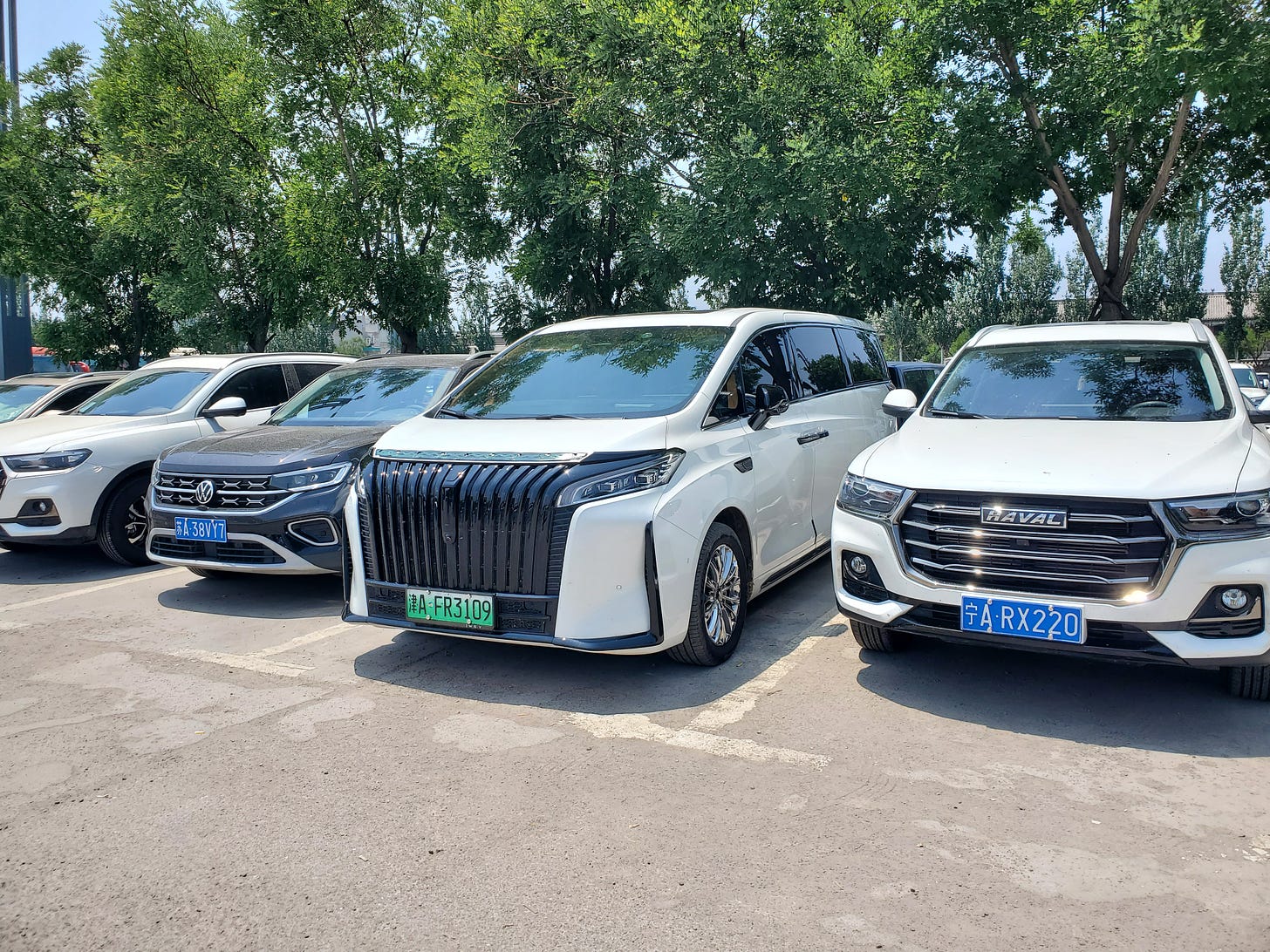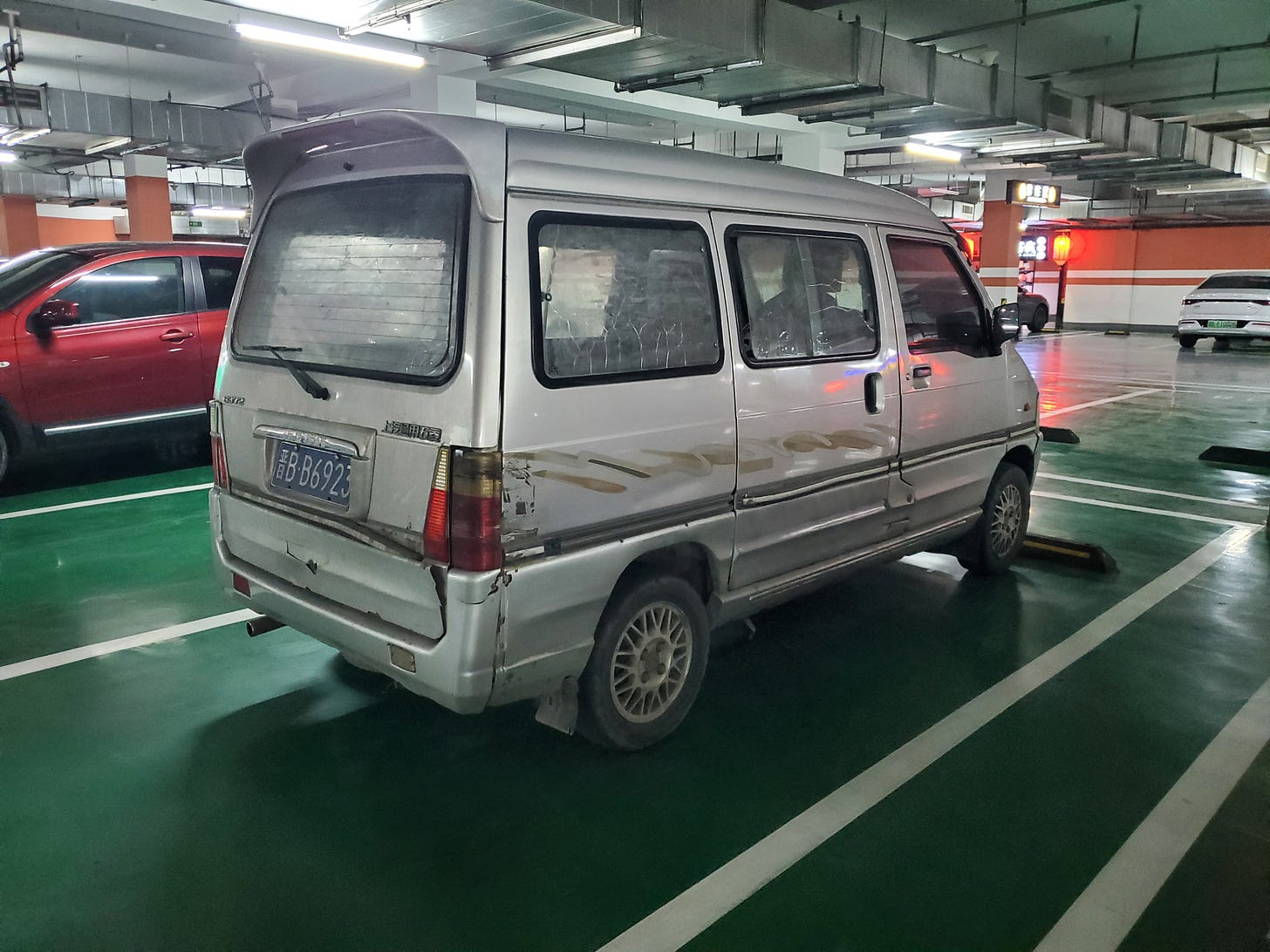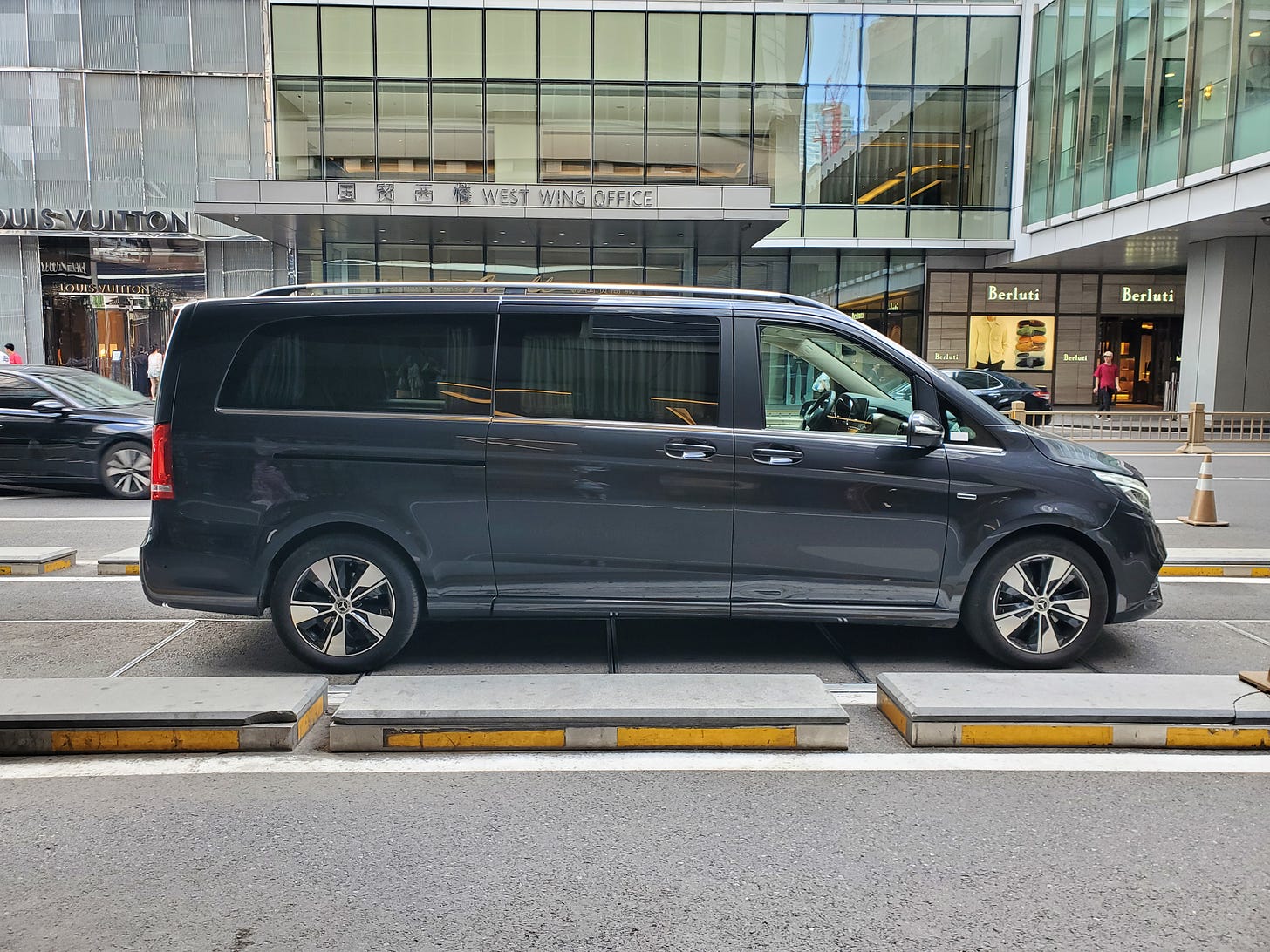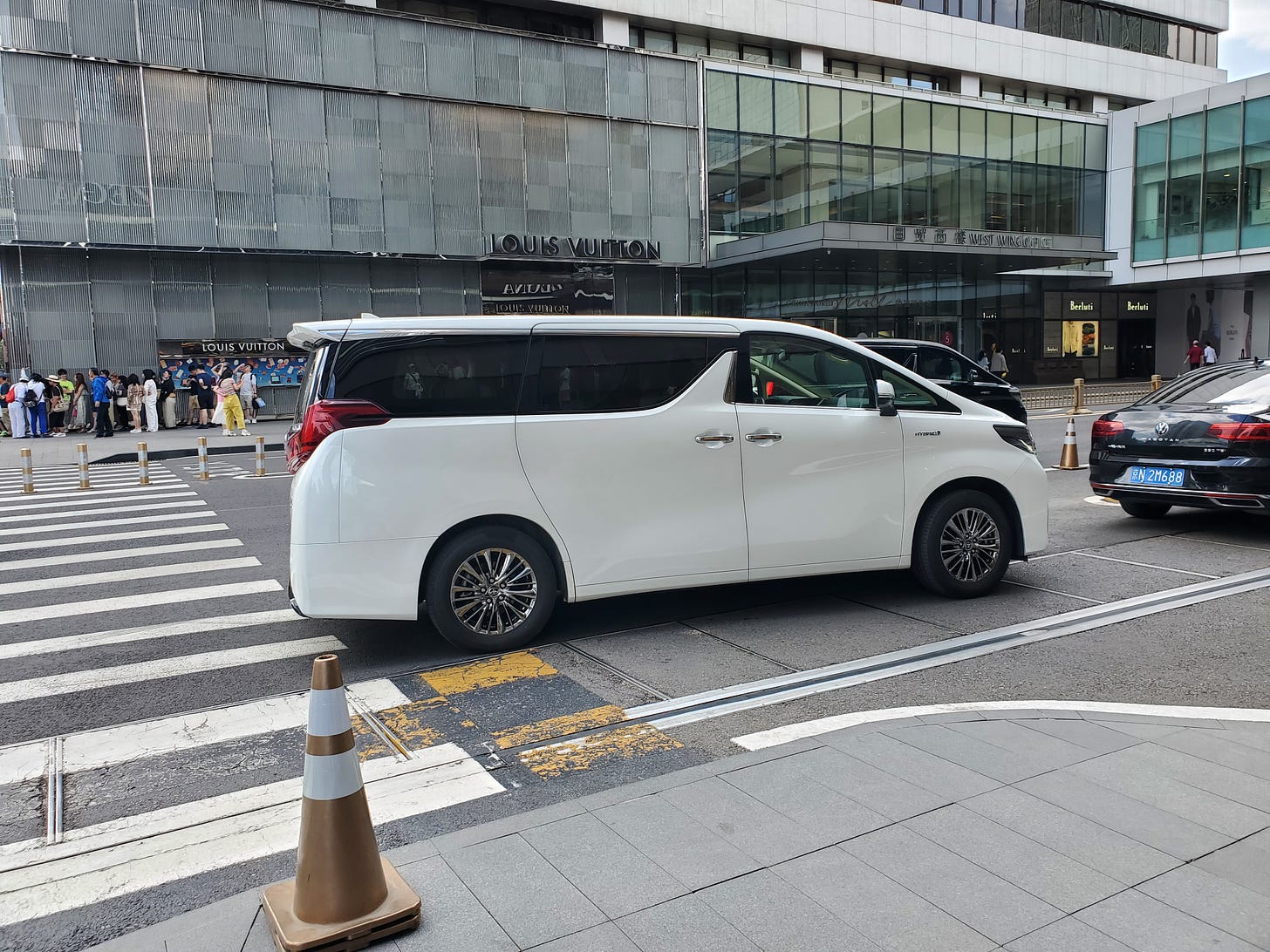One of the first things I start to take in about a new or unfamiliar place, especially a foreign country, is the private vehicle fleet—in other words, the vast, broad collection of all the cars and trucks and other vehicles out there. By private, I mean personal cars, as opposed to whatever vehicles fire agencies, police, or garbage collection is using, though I notice those too.
I was just in China for two weeks, visiting my wife’s family in the Northeast (I was sort of in the Chinese Boston, latitude-wise), and we also did some road-tripping in Shanxi province (they love their vinegar) with a driver, which is a cheap service there. Our driver used a very nice minivan with a faux-wooden floor. Do you know what brand the minivan was? Buick.
I’m going to write another piece about the overall range of vehicles I saw in China, but here, I’m going to write about minivans. I saw a lot of minivans in China. In addition to the Buick models, which partly comprise a “luxury minivan” segment almost exclusive to the Chinese market, there are tons of domestic-brand minivans out there.
Now you’d think in a country famous (infamous) for its low birth rates, the minivan, of all vehicle types, might be a tough sell. It’s not exactly the kind of car you buy to show off, even if it’s a nice one. In America, it’s practically a symbol of the large family, and it has a (very undeserved) frumpy reputation that leads lots of people to buy much less useful, and more dangerous, SUVs.
There are SUVs in China, but a lot fewer of them than in the U.S., especially the really large ones like the Chevy Suburban or Ford Expedition. I thought at first that the absence of a light-truck loophole regulatory quirk in China might explain this, but then I recalled that minivans are also typically regulated as trucks in the U.S.
So people there actually like minivans. The minivan is obviously useful for large families, or just for large groups of people—that’s why a professional driver uses one, I suppose. It clearly doesn’t have that soccer-mom reputation, or whatever, in China. It’s a good reminder that the opinions and cultural trappings we attach to things mostly are not inherent in those things themselves. Things appear different when we change our perception of them. That applies to a lot of things.
What else might explain their popularity vis-a-vis other large vehicles, or sedans? (I was surprised that the average car size looked probably larger than in Europe.) This report says the end of the one-child policy boosted the minivan market for those families that did or do have multiple children. Another article confirms that. That makes sense.
But another thing is minivans are especially spacious vehicles inside. They feel big relative to their size—bigger, I personally think, than SUVs—and that spaciousness and room also means the vehicles are more comfortable for the elderly. They’re also often lower to the ground than SUVs, making them easier to step into.
Most Chinese vehicles are probably city cars, and occasional road-trip cars. But they don’t need the four-wheel drive and the high ground clearance that American motorists seem to want, since we use our cars more and more often and in all climates and weather. For whatever reason, even businesspeople like a nice minivan over there. I wonder if living in dense urban places, where most Chinese people with higher incomes live, makes a larger, more spacious car feel relatively more luxurious than it does in America.
If you happen to know any more about this vehicle sales segment, leave a comment!
But I wanted to show you all the minivans I photographed, which is a decent amount. Take a look at these. And most of them are in major cities.
This last one has a neat little bit of trivia: this is the original Buick minivan introduced to the Chinese market back in 1999. If it looks familiar to you, then you owned a Chevy Venture or a Pontiac Montana back in the 1990s or early 2000s. Because that’s what this is. Buick is GM, and GM just rebadged their Chevy minivan for the Chinese market, giving it the luxury Buick brand over there—Buick is more popular and has a more luxurious reputation in China than in the U.S. (We, on the other hand, sort of see Buicks the way we see minivans.)
GM never did continue iterating on the minivan in America; they ended sales in the U.S. market in 2008, and are basically the only major car company to not make a minivan these days other than Ford (the Transit van doesn’t generally count.)
So the original Chinese Buick minivan is a descendent of GM’s U.S. minivan, but that lineage died out in the U.S. while it was continued in China, leading to the very nice current iteration of the Buick GL8, which is the luxury vehicle our driver used. (The old one was also called the GL8.) Meaning, if you think of it like evolution, China’s Buick minivan is a sort of lateral relative to America’s extinct GM minivan. I love this sort of thing.
If it’s not clear, I also love minivans. They check all the boxes that a larger vehicle should check—safe, family-friendly, flexible (kids, dog crate, configurable cargo hold, etc.), and for normal driving they’re absolutely fine in terms of power and handling. They also tend to have lower front ends than SUVs, meaning they give you better visibility, which in turn makes them safer for pedestrians. It’s really unfortunate that a dumb image problem leads a lot of people to select a less useful large vehicle.
Since minivans and SUVs are regulated pretty much similarly, I think the disparity must come down to consumer perception. But I would just say, try it, you’ll like it!
Related Reading:
Thank you for reading! Please consider upgrading to a paid subscription to help support this newsletter. You’ll get a weekly subscribers-only piece, plus full access to the archive: over 1,000 pieces and growing. And you’ll help ensure more like this!










I drove a minivan a long time ago when I was a small business owner and had to haul around computers (back when monitos were CRTs!). It was a fantastic vehicle for hauling cargo. I have never understood the appeal of an SUV. If I want a 4WD, I'm going to get a pickup. If I want people room, I'm getting a minivan. SUVs have always struck me as the worst of all worlds.
My parents love their minivan - they love the storage space, especially the room for a dog crate.
Another pro of minivans: the sliding doors, often automatic! For families, especially of young children, this is very helpful. It's honestly the most common dealbreaker I've heard families mention between minivans and SUVs. So yeah, I assume families with SUVs are just in it for the perception.